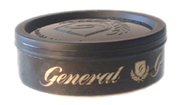Snus
|
|
Snus is a moist powder tobacco, a kind of snuff, that has gone through a fermentation process. The most usual way to consume snus is to place it beneath the upper lip, and keep it there for a time varying from a few minutes to several hours, according to taste. There are two main types of snus on the market:
- original snus is a loose, moist powder which can be portioned and rolled into a cylindrical shape with the fingertips, or using a prismaster tool. The end result is often referred to as a pris.
- portionssnus, is prepackaged powder in small bags made from the same material as teabags. It comes in smaller quantities than the loose powder but is considered easier to handle.

Swedish snus is made from air dried tobacco from various parts of the world. In earlier times tobacco for making snus used to be laid out for drying in Scania and Mälardalen. Later smokedried Kentucky tobaccos were used. The ground tobacco is mixed with water, salt, sodium carbonate and aroma and is prepared through heating, generally via steam. Moist snus contain more than 50% water, and the average use of snus in Sweden is approximately 800 grams (16 units) per person per year.
Snus is sold mainly in Norway and Sweden, but can be found in outlets in various other countries frequented by Scandinavian tourists. It is sold in small tins, which in the earlier years were made of porcelain, wood, silver or gold, but nowadays come in compressed paper or plastic. They contain 50g of loose snus or 24g of portion bags. In Sweden portion snus is usually sold in plastic boxes and loose snus is sold in paper boxes, while in Norway they are only available in plastic.
The price for the 50g product is approximately €2.50 in Sweden and €6.00 in Norway, and the total production of Swedish snus, mainly for the Scandinavian market, has been reported to be in excess of 300 million units per year. After the Norwegian government in June 2004 implemented a strict indoor smoking ban in public places, sales of snus skyrocketed, and several new variants of the product was put on the Norwegian market.
| Contents |
Health consequences
Since snus is not intended nor recommended for inhalation, it does not affect the lungs like cigarettes do, although it does contain more nicotine than cigarettes, and might pose a risk for oral cancer or cardiovascular disease. The World Health Organization (WHO) acknowledges that Swedish men have the lowest rate of lung cancer in Europe, partly due to the low tobacco smoking rate, but does not argue for substituting snus for smoking, citing that the effects of snus still remain unclear. The European Union banned the sale of snus in 1992, after a 1985 WHO study (http://193.51.164.11/htdocs/monographs/vol37/tobaccosmokeless.html) concluded that "oral use of snuffs of the types used in North America and western Europe is carcinogenic to humans", but a WHO committee on tobacco has also acknowledged that evidence is inconclusive regarding health consequences for snus consumers.
Only Sweden and EFTA-member Norway are exempt from the EU ban. A popular movement during the run-up to the 1994 referendum for Sweden's EU membership made the exemption of EU's criminalization of snus a part of the membership treaty.
Debate among public health researchers
There is some debate among public health researchers over the use of "safer" tobacco or nicotine delivery systems, generally dividing along two lines of thought. Most researchers presently are of the "abstinence" belief, believing that no form of tobacco or nicotine use is acceptable or safe, and should be minimized among the population. The growing minority (primarily in the European Union and Canada) believes in "harm reduction," where the belief is generally that, while it should remain a goal to reduce addiction to nicotine in the population, the reduction of harm to the health of those who choose to use nicotine should override the need to reduce overall nicotine addiction. For example, some research (http://www.tobaccoprogram.org/TC12%20349.pdf) available today shows that snus use reduces or eliminates the risk of cancers that afflict other users of tobacco products such as "chewing tobacco" (the type primarily used in the United States and Canada, created in a process similar to cigarette tobacco) and cigarettes. In addition, rather obviously, this eliminates any exposure to "second-hand smoke", further reducing possible harm to other non-tobacco users. This is seen by public health advocates who believe in "harm reduction" as a reason for recommending snus in addition to other nicotine replacement therapies rather than continued use of cancer-causing nicotine delivery systems.
See also
- Tobakskompaniet
- KungsSnus
- Jacob Ljunglöf
- General snus
- Göteborgs Rapé
- Ettan
- Grovsnus
- Röda Lacket
- Catch snus
- Tre ankare
- GothiaTek
- Swedish Match
Published peer-reviewed studies
- Effect of smokeless tobacco (snus) on smoking and public health in Sweden (http://www.tobaccoprogram.org/TC12%20349.pdf), October, 2003
General media articles
- A Smokeless Alternative To Quitting [Unabridged Version (http://www.sallysatelmd.com/html/a-nytimes9UA.html)], The New York Times, April 6, 2004
- Tobacco Harm Reduction Taking Hold; Reduced Risk Benefits of Swedish Snus Gaining Awareness in American Society (http://releases.usnewswire.com/GetRelease.asp?id=102-04162004), U.S. Newswire, April 24, 2004
External links
- SnusButiken.se (http://www.snusbutiken.se/)
- Swedish snus (http://www.swedish-snus.com/)
- Some practical points on harm reduction: what to tell your lawmaker and what to tell your brother about Swedish snus (http://tc.bmjjournals.com/cgi/content/full/12/4/372), Tobacco Control Online, December, 2003da:Snus
